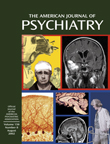Thyroid Hormones and Antidepressant Response
To the Editor: We read with great interest the review and meta-analysis by Lori L. Altshuler, M.D., et al. (1) about thyroid hormone supplementation accelerating tricyclic antidepressant response. One possible explanation is that the patients treated with tricyclic antidepressants in those studies may have had overt or subclinical hypothyroidism whose correction with triiodothyronine (T3) allowed them to overcome impaired response to tricyclic antidepressants.
In a previous study (2), we showed that subclinical hypothyroidism is not rare among patients with episodes of major depression (5.3%) and that serum concentrations of thyrotropin, or thyroid-stimulating hormone (TSH), at or above the upper 25th percentile of the normal reference range may be associated with characteristics of severe major depression. Consequently, we systematically measured TSH, thyroxine (T4), and T3 serum levels in 101 consecutive patients hospitalized for episodes of major depression. The Hamilton Depression Rating Scale was administered at entry and after 28 days of antidepressant therapy. All patients gave written informed consent. The observer assessing scores on the Hamilton depression scale was unaware of serum thyroid hormone test results. Nine patients (9%) had serum TSH concentrations at or above the upper 25th percentile of the normal reference range (group A); only three (3%) had serum TSH concentrations higher than the upper limit of the normal reference range. All nine of these patients were women, and this sex distribution was significantly different from that for patients with serum TSH concentrations below the upper 25th percentile of the normal reference range (group B) (χ2=5.47, df=1, p<0.02). Group A had a higher serum TSH concentration than did Group B (mean=4.31 μIU/liter, SD=3.27; mean=1.13 μIU/liter, SD=0.55, respectively) (Mann-Whitney z=4.93, p<0.001) and a higher T3 concentration (mean=3.44 ng/ml, SD=7.10; mean=0.85 ng/ml, SD=0.22) (Mann-Whitney z=1.65, p<0.10) but not a higher serum T4 concentration (mean=10.14 ng/ml, SD=1.02; mean=10.71 ng/ml, SD=2.20).
The scores on the Hamilton depression scale were similar at entry (group A: mean=21.89, SD=5.93; group B: mean=23.21, SD=5.33), but group A’s response to antidepressant treatment (tricyclic antidepressants, N=3; selective serotonin reuptake inhibitors, N=3; serotonin/norepinephrine reuptake inhibitors, N=5) at day 28 was significantly less than for group B (decrease in score on the Hamilton depression scale—group A: mean=8.67, SD=6.86; group B: mean=14.70, SD=8.12) (analysis of covariance: F=4.22, df=2, 98, p<0.05). The mean ages, frequencies of previous suicide attempts, and rates of recurrent depression were not different between the groups.
The definition of the normal reference range of serum TSH concentrations is established in healthy subject populations without clinical signs of thyroid dysfunction. It is not known whether this “endocrinological” reference range can be applied to patients with depression. High-normal serum TSH concentrations are associated with an exaggerated TSH response to thyrotropin-releasing hormone in depressed patients (3), and subtle thyroid axis modifications may account for up to 36% of the variance in antidepressant treatment outcome (4). We suggest that screening for serum TSH concentration in patients with major depression is helpful in identifying those who have concentrations at or above the upper 25th percentile of the normal reference range. The supplementation of antidepressant therapy by thyroid hormones is particularly indicated in these patients.
1. Altshuler LL, Bauer M, Frye MA, Gitlin MJ, Mintz J, Szuba MP, Leight KL, Whybrow PC: Does thyroid supplementation accelerate tricyclic antidepressant response? a review and meta-analysis of the literature. Am J Psychiatry 2001; 158:1617-1622Link, Google Scholar
2. Berlin I, Payan C, Corruble E, Puech AJ: Serum thyroid-stimulating-hormone concentration as an index of severity of major depression. Int J Neuropsychopharmacol 1999; 2:105-110Crossref, Medline, Google Scholar
3. Kraus RP, Phoenix E, Edmonds MW, Nicholson IR, Chandarana PC, Tokmakejian S: Exaggerated TSH response to TRH in depressed patients with “normal” baseline TSH. J Clin Psychiatry 1997; 58:266-270Crossref, Medline, Google Scholar
4. Sullivan PF, Wilson DA, Mulder RT, Joyce PR: The hypothalamic-pituitary-thyroid axis in major depression. Acta Psychiatrica Scand 1997; 95:370-378Crossref, Medline, Google Scholar



